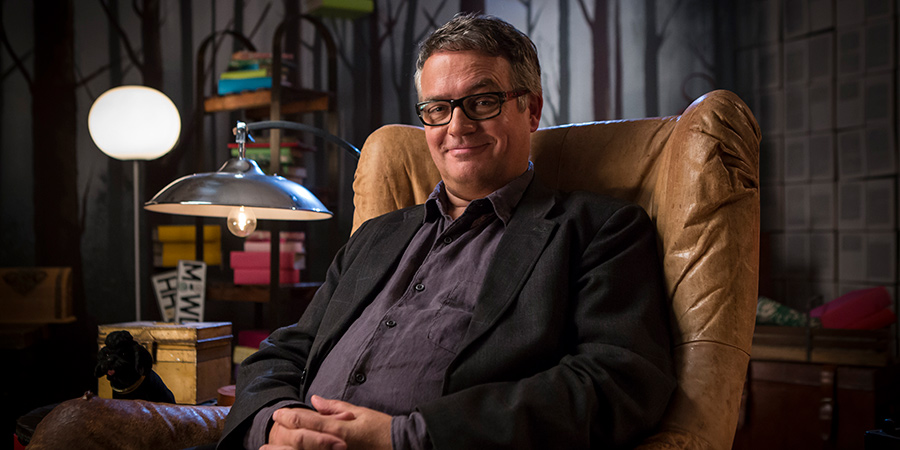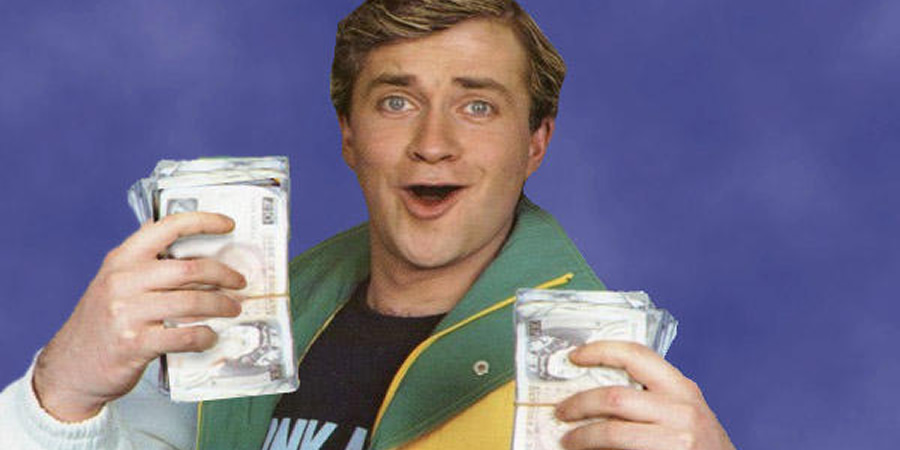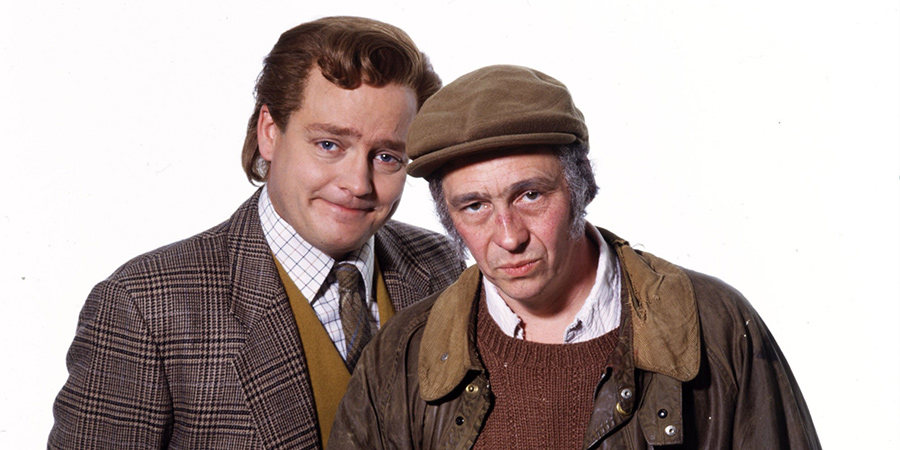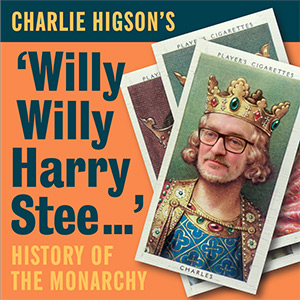Members Ask... Charlie Higson, part 1

Charlie Higson has enjoyed a stellar career as a performer, script writer, script editor, and novelist. He is currently presenting Willy Willy Harry Stee..., a podcast series in which he gives his personal take on the story of England's monarchy. Here, he answers our members' questions about comedy-related topics.
How did you build up your comedy writing skills?
As with any skill you just have to do it and keep doing it. I started writing when I was about 10. So, once I got round to writing comedy in my 20s I was comfortable and confident with the process. Scriptwriting is not fundamentally different to writing a novel. And picking up the basics is pretty easy.
When it comes to honing my comedy skills, I suppose I started out like anyone else - trying to make my friends laugh. I wrote a couple of comedy plays when I was in the 6th form at school with a like-minded friend, and we put them on together. We were big Monty Python fans, so we just copied them. It went well enough to make me think I might do more of this again one day.
Then I met Paul Whitehouse at university. He was a funny guy and he seemed to find me funny, so, over the next few years, we tried to make each other laugh. Our first actual comedy writing gig was working with Harry Enfield, writing Stavros for Saturday Night Live and then working with him to create Loadsamoney for Friday Night Live. I guess we got off to a good start. We had a lot of encouragement, support and guidance from one of the producers, Geoffrey Perkins, who we went on to work with many times over the years. He was hugely influential in teaching me the business of comedy.
I guess, if you want to hone your skills, try to make someone laugh. But don't be a tit about it.

What do you think the most important 'rules' are, when it comes to writing comedy?
Well, there's only one rule, really - make it funny. And that's the one thing you can't teach someone. There are a lot of skills you can learn, structure, editing, layout, mechanics... but 'how to be funny'? No. It's very hard to put your finger on what makes something funny. It's a mysterious thing. What makes one person laugh will leave another cold, and vice versa. And it changes all the time. Some comedy from the past has lasted, some hasn't, some will be rediscovered and come back into fashion one day. So, as I say, it's impossible to define what makes something funny.
Some pointers, though.
Make it truthful. Don't twist something simply to try to make a joke. Don't have someone behave out of character just because you think it'll get a laugh. Don't pretend the world is one way when we all know it's another. That sort of approach stinks. Even what you might call 'surreal comedy' or 'wacky comedy', will always have a hard core of truth to it. Also, if you can tell somebody something true which they hadn't really thought about or realised before, so that it becomes a revelation, then you're onto a winner.
Attention to detail is important. Don't be sloppy. Work at things. Is there a better way of saying something? Is there a way of making your humour specific rather than generic? Look at what Victoria Wood did, or Caroline Aherne. Their work was full of the details of everyday life. If someone mentions a biscuit - what biscuit? What is funniest? What sort of biscuit would this person eat? What biscuit defines them and sums them up?
If you're writing character comedy, have your characters speak in their own way. Don't just produce lazy, off the peg, caricatures. For instance, say you wanted to write a posh bloke. Don't have them come into a room and spout things like "I say, old chap..." People haven't spoken in that way for a long while. Observe and listen to how modern posh people speak, note the language they use, their terms of reference, etc.
Part of the success of Loadsamoney was down to the fact that Harry, Paul and I were living in Hackney at the time. We were surrounded by these people - plumbers, electricians, plasterers, whatever, who were making good under the new Thatcherite economics. So, we presented what we felt was a more accurate 'builder' character than you would normally see on a sketch show. And we were able to put in specific language and points of reference as well.
Simon Day uses language brilliantly with his characters. He comes out with phrases and colloquialisms that are spot on and different to what you usually hear - and why I could never have written lines for most of his characters. His individualism is what makes his comedy real and funny and personal.
Look at something you've written - can it be made more personal? Can it be done better? Can there be some more funny details in it? Keep writing and rewriting but never lose sight of what originally made you laugh. Don't lose sight of the joke.

I really became emotionally invested in Ted and Ralph's relationship. Did you set out with this kind of reaction in mind, or did it evolve as you added more sketches for them?
The characters of Ted and Ralph were created and originally written by the brilliant writing partnership of Arthur Matthews and Graham Linehan. They'd written a few other pieces for the first series of The Fast Show and we were nearing filming when we went to the pub with them and asked if they had anything else - and they acted out the Ted and Ralph 'Tina Turner' sketch (this is why Ted is Irish - because it sounded funny when they did it with their Irish accents). We found the routine very funny but couldn't quite put our fingers on why.
I guess there was the seriousness and awkwardness to start with and then the unexpected turn when Ralph starts trying to get Ted to come to a gig with him. The incongruousness was funny, but it also seemed to say something about relationships. About the difficulties of chatting someone up, never quite knowing what the boundaries are. I think that's something everyone can relate to. I could certainly relate to it - having failed miserably to ever pick up a girl at a teenage disco. So, I guess it's a sketch about someone trying to pick someone up - but they're the most unlikely pair.
Graham and Arthur wrote many of the early sketches and carried on writing Ted & Ralph sketches right through The Fast Show, but, after we'd done a few of them, the characters took on a life of their own and Paul and I widened it out so that it was about other things, as well - love and loss, loneliness, romanticism, nostalgia, mental health, notions of Englishness... We got glimpses of Ralph's loveless, dysfunctional upbringing, his passionate and perhaps slightly old-fashioned devotion to a pastoral version of England. There was so much we could do with these characters and, Ralph, although he was, for most of the time, clumsy and incoherent, when he go onto something he was passionate and could deal with his emotions obliquely, he could suddenly become quite poetic. They were one of the most fun characters to write and to play because we felt we were mining a very rich seam.
And whenever Paul and I disappeared too far up our arses, we could always rely on Graham and Arthur to supply a traditional Tina-Turner-style sketch with gags in it.
Our thanks to Charlie - and we'll have more from him in part 2!
See also: Part 1

Charlie Higson's current project is Willy Willy Harry Stee..., a podcast series in which he gives his personal take on the story of England's kings and queens. The schooltime rhyme, which lists every English monarch since William the Conqueror, will be familiar to many educated in the UK, but beyond their names, who were Willy, Willy, Harry, Stee and the rest of their regal cohort? Charlie attempts to answer this question, and many more, with the help of historical experts.
Willy Willy Harry Stee... is available on podcast apps including Acast and Apple
This article is provided for free as part of BCG Pro.
Subscribe now for exclusive features, insight, learning materials, opportunities and other services for comedy creators.

